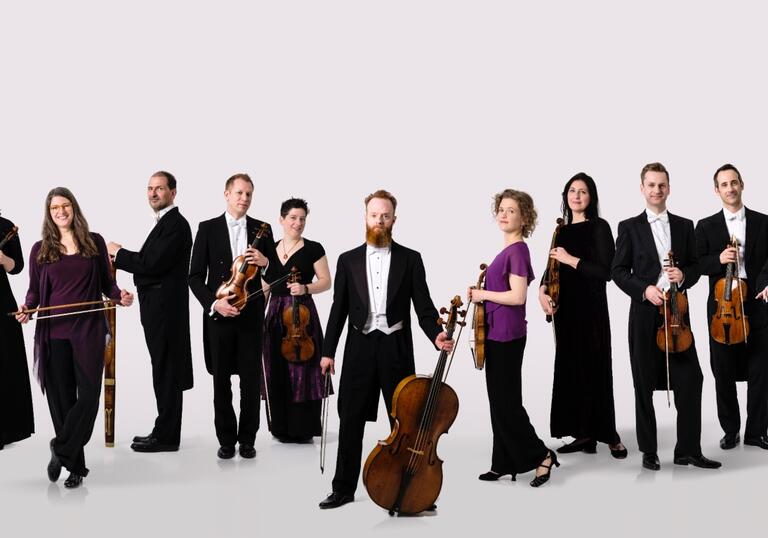
Programme and performers
George Frideric Handel
Music for the Royal Fireworks
1. Overture
2. Bourrée
3. La Paix
4. La Réjouissance
5. Menuets I and II
Foundling Hospital Anthem
1. Aria: Blessed are they that considereth the poor
and needy
2. Chorus: They deliver the poor that crieth
3. Aria: O God, who from the suckling’s mouth
4. Chorus: The charitables shall be had in everlasting
remembrance
5. Chorus: Comfort them, O Lord, when they are sick
6. Duet: The people will tell of their wisdom
7. Chorus: Hallelujah
Interval
Selection from Solomon
1. Overture
2. Your harps and cymbals sound
3. Praise ye the Lord
27. My sovereign liege
28. Words are weak
29. What says the other
30. Thy sentence, great king
31. Withhold
32. Can I see my infant gored?
33. Israel attend
34. Thrice blessed be the king
41. Symphony: The arrival of Queen of Sheba
58. May peace in Salem ever dwell
59. Will the sun forget to streak
53. Thrice happy king
54. Golden Columns
55. Praise the Lord
The English Concert
Harry Bicket conductor
Ann Hallenberg Solomon
Miah Persson Queen and First Harlot
Elena Villalón Queen of Sheba
Brandon Cedel Levite
James Way Zadok
Niamh O’Sullivan Second Harlot
The Clarion Choir
Steven Fox choir artistic director
Song texts
Aria (Tenor)
Blessed are they that considereth the poor
and needy:
the Lord will deliver them in time of trouble,
the Lord preserve them and comfort them.
Chorus
They deliver the poor that crieth, the
fatherless
and him thamt hath none to help him.
The Lord will comfort them.
Aria (Alto)
O God, who from the suckling’s mouth
ordaineth early praise,
of such as worship Thee in truth
accept the humble lays.
SATB soloists
The charitables shall be had in everlasting
remembrance
and the good will shine as the brightness of
the firmament.
Chorus
Comfort them, O Lord, when they are sick:
make thou their bed in sickness.
Keep them alive, let them be blessed upon the
earth
and not deliver them unto their foes.
Duet
The people will tell of their wisdom,
and the congregation will shew forth their praise.
Their reward is also with the Lord,
and the care of them is with the Most High.
Chorus
Hallelujah.
The Kingdom of this world
is become the kingdom of our Lord
and of His Christ,
and He shall reign forever and ever.
Hallelujah!
Artist biographies
The English Concert is an outstanding orchestra, renowned for the quality, ambition and variety of its live and recorded output; and unwavering in its desire to connect with its audience the world over.
Under the artistic direction of Harry Bicket and principal guest Kristian Bezuidenhout, The English Concert has earned a reputation for combining urgency, passion and fire with precision, delicacy and beauty.
The artistic partners with which it collaborates reflect and enhance its pursuit for new ways to bring repertoire to life. These include Joyce DiDonato, Dame Sarah Connolly, Iestyn Davies, Alison Balsom, Trevor Pinnock, Dominic Dromgoole and Tom Morris, among many others, all of whom have not only brought their skills to individual projects but continue to help shape the way the ensemble performs.
One cornerstone of the orchestra’s annual cycle is its international Handel Opera tour. Blossoming from an ongoing relationship with Carnegie Hall, the itinerary now regularly takes in the Theater an der Wien, Théâtre des Champs-Élysées, Hamburg Elbphilharmonie and Barbican Hall, and the roster of great halls continues to grow. Meanwhile, its regular London series allows it to explore a radically different path, presenting programmes designed to challenge and inspire.
The English Concert is associate orchestra at Garsington Opera.
In 2023, the orchestra launched Handel for All, a landmark project to film and make freely available all of Handel’s works. www.englishconcert.co.uk/handel-for-all
The English Concert would like to acknowledge an anonymous donation in memory of and with thanks to David Craig, a former trustee of the orchestra, given in generous support of this project.
